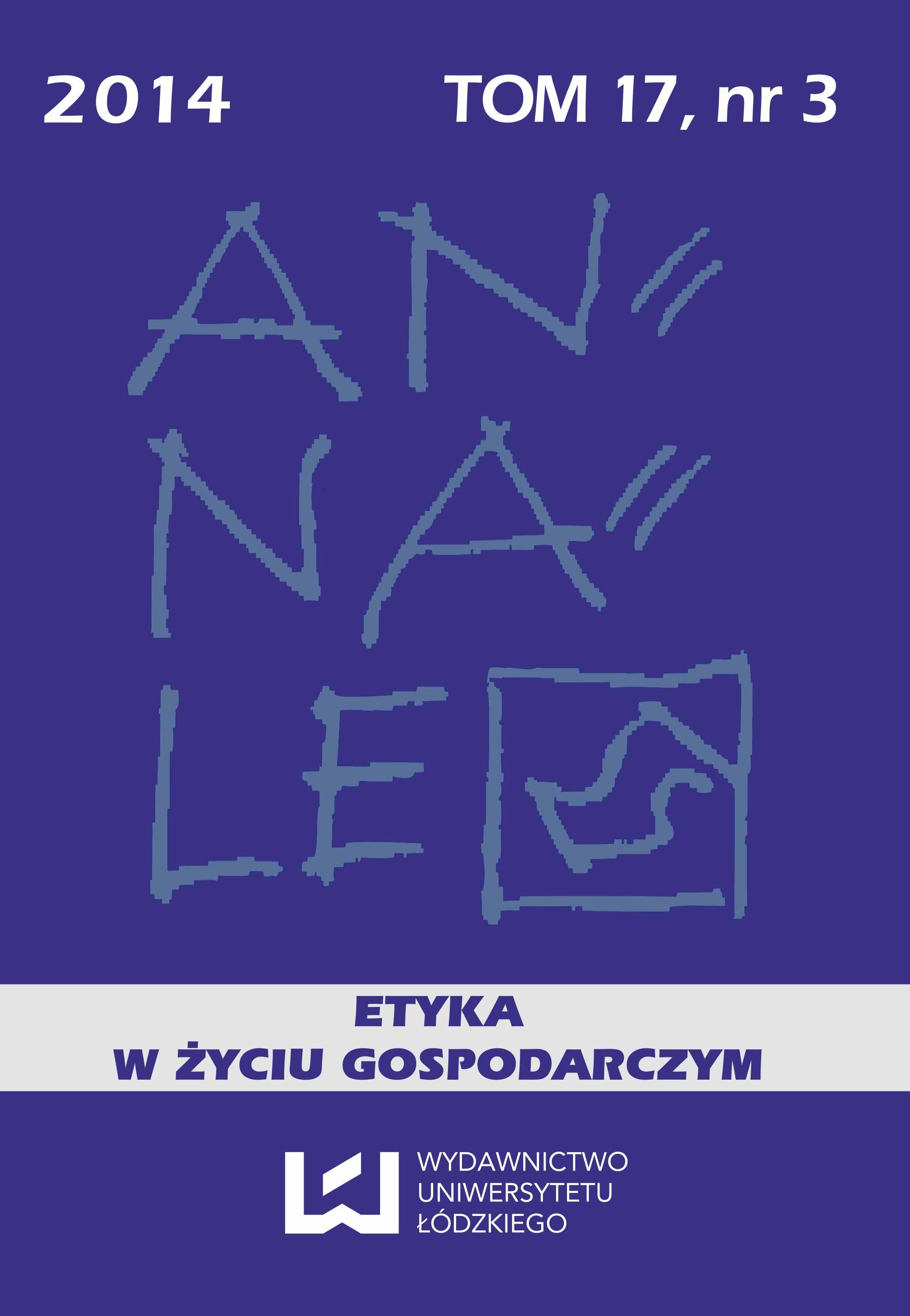Wolność gospodarcza a poczucie odpowiedzialności za dobro wspólne
DOI:
https://doi.org/10.18778/1899-2226.17.3.01Słowa kluczowe:
economic freedom, responsibility, common good, market, axio-normative orderAbstrakt
The main purpose of the paper is to describe, diagnose and interpret mutual rela-tions between the idea of economic freedom and the sense of responsibility for the common good in modern societies functioning in the system of a free market economy. The starting point for the analysis is a reference to predominating scientific discourses and their appearance in the public sphere. These discourses also take up the problem of mutual relations between freedom and responsibility, including responsibility for the common good. One specific case of the relation between units and the widely understood common good, including units engaged in economic activity, is their relation to more operational public goods. Therefore, starting from conclusions based on a probing research concerning Polish society’s attitude towards public goods (which is an index of public morality), we will try to prove that an oversimpli-fied and highly ideological understanding of economic freedom can lead to a) perception of market activities’ results in strictly economic categories, b) atrophy of priority values for each society such as the sense of responsi-bility and common good. Therefore the main thesis of the paper can be seen as the following state-ment: for each economic organization to perform correctly, it must be socially embedded in a defined axio-normative order. Economic order is a part of social order while freedom, as the leading objective idea, cannot be treated either in purely scientific or ideological categories.Bibliografia
Balcerowicz L., (wstęp i wybór tekstów źródłowych), Odkrywając wolność. Przeciw zniewoleniu umysłów, Wyd. Zysk i S-ka, Warszawa 2012.
Google Scholar
Bard A., J. Söderqvist, Netokracja. Elita władzy i życie po kapitalizmie, Wydawnictwa Akademickie i Profesjonalne, Warszawa 2006.
Google Scholar
Berlin I., Cztery eseje o wolności, Wyd. Zysk i S-ka, Poznań 2000.
Google Scholar
Dahrendorf R., Life Chances. Approaches to Social and Political Theory, Weidenfeld and Nicolson, London 1979.
Google Scholar
Golinowski J., Antynomie i wyzwania polskiej transformacji, „Transformacje. Pismo interdyscyplinarne”, nr 1-2, s. 287-317.
Google Scholar
Gray J., Dwie twarze liberalizmu, Fundacja „Aletheia”, Warszawa 2001.
Google Scholar
Kojder A., Destrukcja normatywności; jej współczesne przejawy i skutki społeczne [w:] Śląsk-Polska-Europa. Zmieniające się społeczeństwo w perspektywie lokalnej i globalnej.
Google Scholar
Xiega X Ogólnopolskiego Zjazdu Socjologicznego, red. A. Sułek, M.S. Szczepański, PTS, Katowice 1998.
Google Scholar
Krasnodębski Z., O czym można dyskutować w demokracji?, „Znak” 2000, nr 1 (536), s. 10-43.
Google Scholar
Łętowska E., J. Woleński, Czy prawo zatruwa wolność?, „Przegląd Filozoficzny. Nowa Seria” 2013, nr 3 (87), s. 9-26.
Google Scholar
Mannheim C., The Problem of the Sociology of Knowledge [w:] Essays on the Sociology of Knowledge, red. C. Mannheim, Routledge & Kegan, London 1952.
Google Scholar
Putnam R., Demokracja w działaniu, Wydawnictwo Znak, Kraków 1995.
Google Scholar
Rawls J., The Domain of the Political and Overlapping Consensus, “Law Review”, 1989, No 64.
Google Scholar
Reykowski J., Wolność gospodarcza jako ideologia, „Studia Socjologiczne”, 3/2013 ( 210), s. 7-29.
Google Scholar
Standing G., The Precariat. The New Dangerous Class, Bloomsbury Academic, London 2011.
Google Scholar
DOI: https://doi.org/10.5040/9781849664554
Szacki J., Indywidualizm i kolektywizm, Wstępna analiza pojęciowa [w:] Indywidualizm i kolektywizm, red. J. Szacki, Wyd. Naukowe PWN, Warszawa 1999.
Google Scholar
Weber M., Gospodarka i społeczeństwo, Wyd. PWN, Warszawa 2002.
Google Scholar
Pobrania
Opublikowane
Jak cytować
Numer
Dział
Licencja

Utwór dostępny jest na licencji Creative Commons Uznanie autorstwa – Użycie niekomercyjne – Bez utworów zależnych 4.0 Międzynarodowe.









